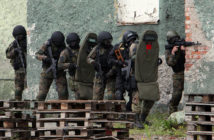Forbes Magazine
Christopher Coats, Contributor
I write about energy and policy issues facing the Mediterranean region

Satellite image of Africa, showing the ecological break that defines the sub-Saharan area (Photo credit: Wikipedia)
As much of North Africa struggled with the aftermath of the Arab Spring these past few years, Algeria seemed like a safe exception. Alongside Morocco, Algeria was largely able to sidestep the kind of widespread unrest and violence that ousted long-standing governments to the east, west and south. Still flush with oil and gas revenue, Algiers was able to throw money at its problems, largely quelling labor and social protests. Algeria still had a host of political and social issues to cope with, but unlike its neighbors, violence was not really one of them.
That is, until last January when militants crossed Algeria’s southern border with Mali to attack a gas facility operated by Norway’s Statoil and the UK’s BP along the country’s border with Libya. Angry that the government had allowed the country’s air space for air raids against a separatist movement in Northern Mali, the group targeted Algeria’s economic life blood – hydrocarbons. Following four days of fighting, scores were left dead, including 39 foreign workers. Algeria had kept domestic violence at bay, but they were unable to stop regional unrest from spilling over its borders. The attack was the first time Algeria’s vital energy sector had been successfully targeted since 1955, according to an Economist report.
In the year since, Algeria’s energy leadership – in the shape of state-backed firm Sonatrach – has worked to convince existing and potential energy production partners that Algeria remains a safe bet. The process has been tough.
Since the Arab Spring began in 2011, much of North Africa has struggled with attacks and protests at energy-related facilities. From Egypt’s Sinai Peninsula to Libya’s eastern fields, energy assets have become easy targets for groups in search of attention in a newly chaotic landscape. Most notably, Libya watched their oil and gas output, which makes up the lion’s share of their export revenue, disappear as militias and protest groups shutdown projects across the country throughout 2013. While Algeria only suffered a single, large-scale attack in January, the event came after several years of declining production and foreign investment interest as a result of disappointing results, unfavorable revenue agreements and corruption scandals at the highest levels of the country’s energy sector. In any case, this would prove troubling, but for Algeria, energy earnings make up almost 98 percent it the country’s export revenue and much of the government’s operating budget.
In the months since, Sonatrach and Algeria’s government have set out to convince foreign partners that it is safe to return. Sending nearly 20,000 soldiers to patrol the country’s border where the militants were thought to have entered, Algiers has been insistent that they have the capabilities to protect energy facilities and investigate the attack. However, a report on the attack conducted by Statoiland released in September contradicted the country’s approach, stating that the company had made a mistake by depending on local security. With the government refusing to allow the two companies to provide their own protection, both BP and Statoil have kept foreign workers out of the equation when it comes to the attacked facility.
To be sure, violence and uncertainty are not absolute deal breakers when it comes to Statoil or BP’s presence in the region. Both companies remain present in Algeria, as well as a much more troubling Libya. However, as their resistance to returning foreign workers to the attacked outpost shows, they do not believe that Algeria’s current leadership is up to the job of providing the necessary protection, nor has the government done enough to convince them otherwise.
The country’s leadership has also sought to improve the energy production environment with new, targeted legislation, but had delivered only on new criteria for those interested in supporting a new shale effort.
According to the U.S. Energy Information Administration, the North African country offers about “290 trillion cubic feet of technically recoverable” of shale gas which they base on tests carried out in three provinces over 180,000 sq. km. Facing significant deficits of equipment and expertise, Algeria has turned to foreign partnerships to help provide the guidance to early excavation efforts. Agreements have already been signed with Italy’s Eni, Royal Dutch Shell andExxon Mobil.






